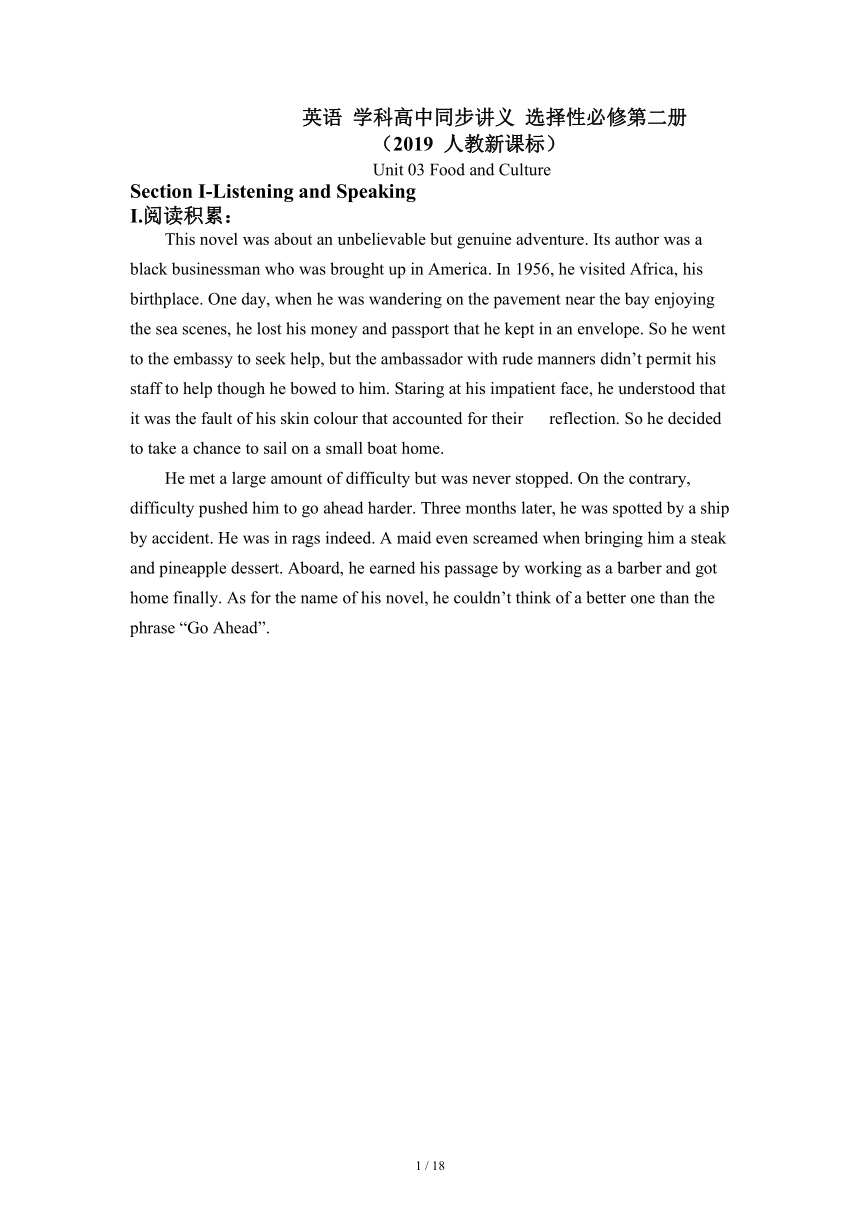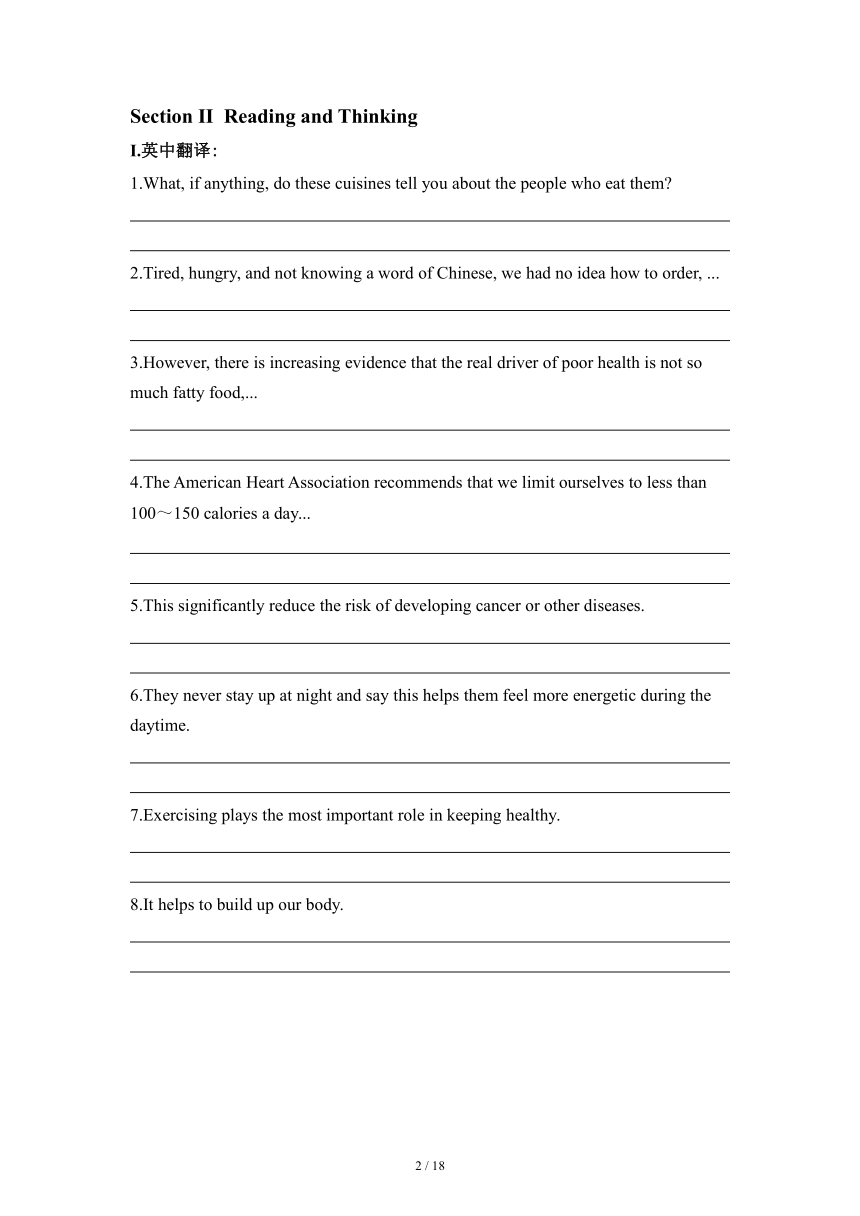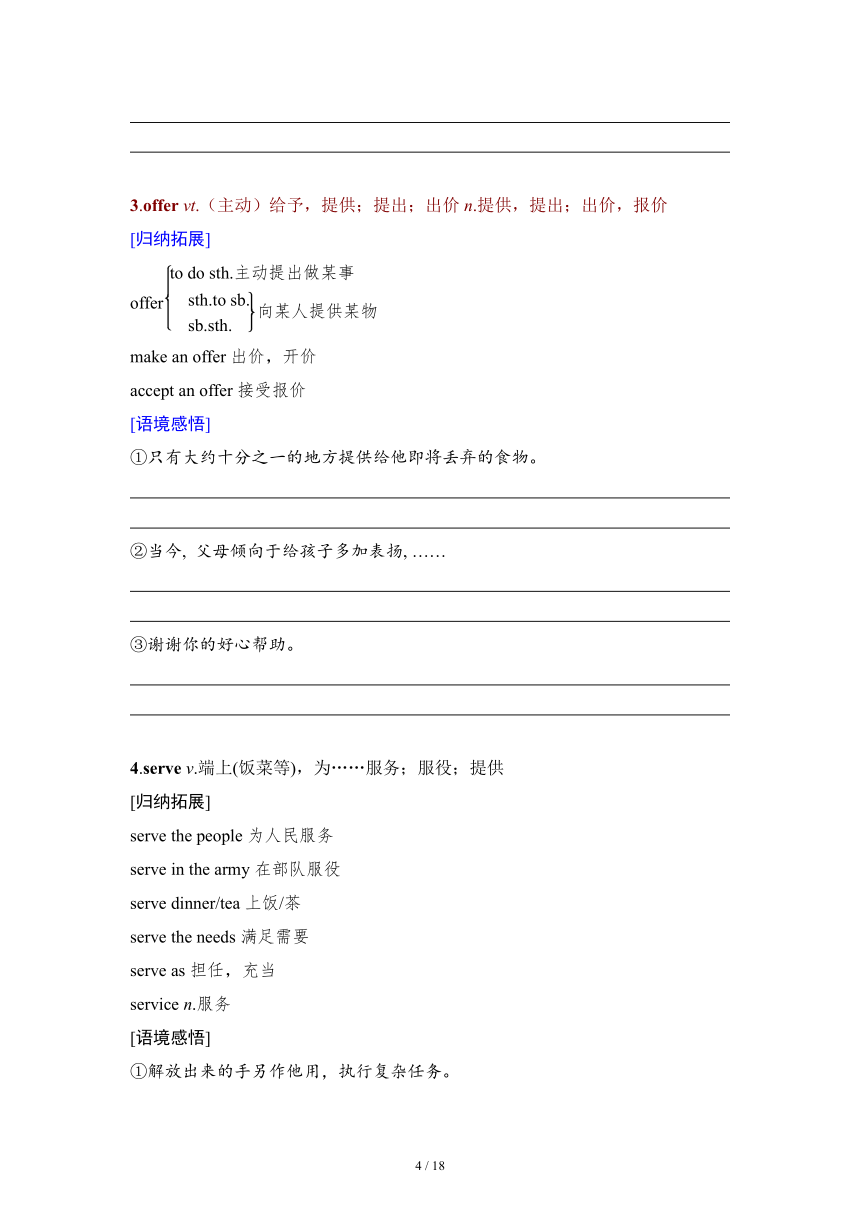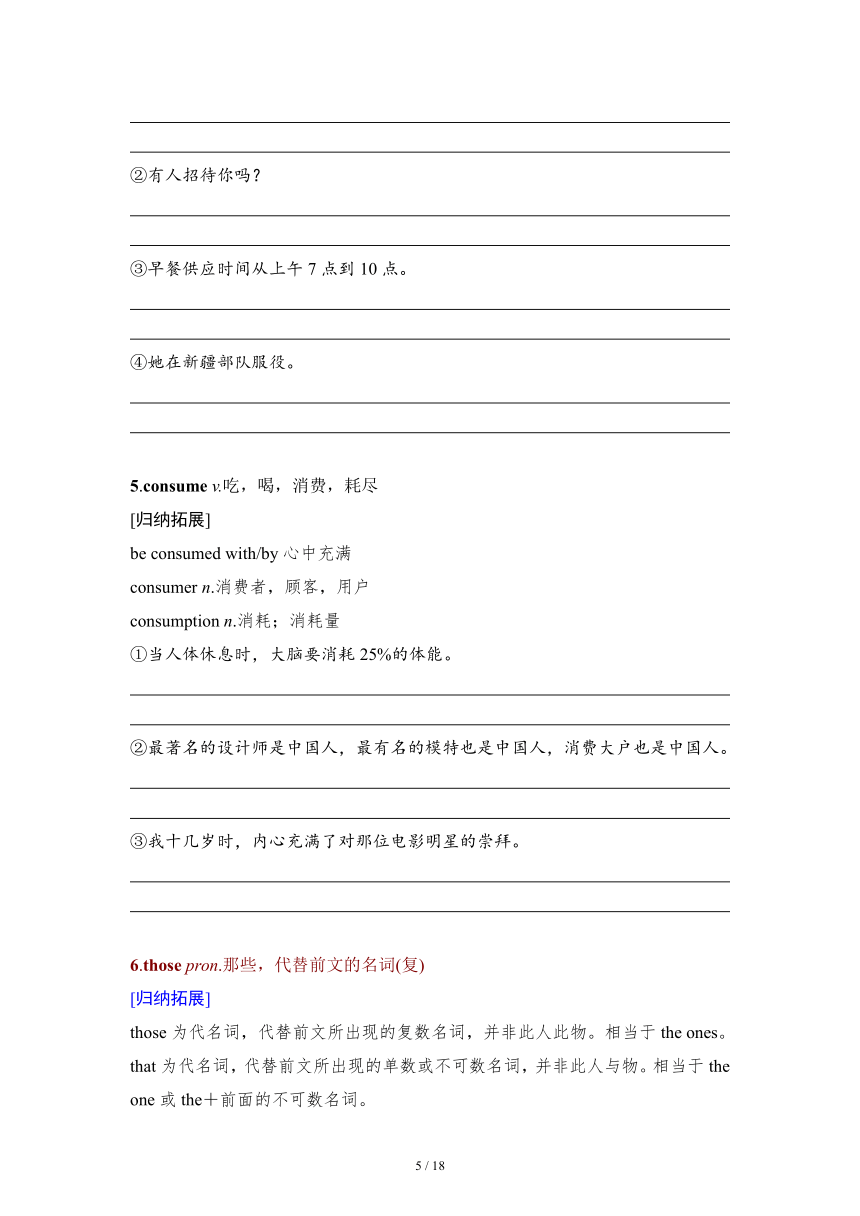人教版(2019)选择性必修第二册Unit 3 Food and culture 同步学案(无答案)
文档属性
| 名称 | 人教版(2019)选择性必修第二册Unit 3 Food and culture 同步学案(无答案) |  | |
| 格式 | zip | ||
| 文件大小 | 115.3KB | ||
| 资源类型 | 教案 | ||
| 版本资源 | 人教版(2019) | ||
| 科目 | 英语 | ||
| 更新时间 | 2022-02-22 19:32:15 | ||
图片预览





文档简介
英语 学科高中同步讲义 选择性必修第二册
(2019 人教新课标)
Unit 03 Food and Culture
Section Ⅰ-Listening and Speaking
I.阅读积累:
This novel was about an unbelievable but genuine adventure. Its author was a black businessman who was brought up in America. In 1956, he visited Africa, his birthplace. One day, when he was wandering on the pavement near the bay enjoying the sea scenes, he lost his money and passport that he kept in an envelope. So he went to the embassy to seek help, but the ambassador with rude manners didn’t permit his staff to help though he bowed to him. Staring at his impatient face, he understood that it was the fault of his skin colour that accounted for their reflection. So he decided to take a chance to sail on a small boat home.
He met a large amount of difficulty but was never stopped. On the contrary, difficulty pushed him to go ahead harder. Three months later, he was spotted by a ship by accident. He was in rags indeed. A maid even screamed when bringing him a steak and pineapple dessert. Aboard, he earned his passage by working as a barber and got home finally. As for the name of his novel, he couldn’t think of a better one than the phrase “Go Ahead”.
Section Ⅱ Reading and Thinking
I.英中翻译:
1.What, if anything, do these cuisines tell you about the people who eat them
2.Tired, hungry, and not knowing a word of Chinese, we had no idea how to order, ...
3.However, there is increasing evidence that the real driver of poor health is not so much fatty food,...
4.The American Heart Association recommends that we limit ourselves to less than 100~150 calories a day...
5.This significantly reduce the risk of developing cancer or other diseases.
6.They never stay up at night and say this helps them feel more energetic during the daytime.
7.Exercising plays the most important role in keeping healthy.
8.It helps to build up our body.
II.新知突破--重难细点拨
1.prior to在……之前
[归纳拓展]
prior to sth.在某事之前,先干某事
priority n.优先事项,首要事情,当务之急
prior warning/notice预先警告/通知
give priority to优先考虑;认为……优先
①如今,旅游的重点已从购物转向了食物和风景。
②调整费用之前协会必须优先通知客户。
③你离开之前一切都要安排好。
2.consist of由……组成
[归纳拓展]
consist of=be made up of
consist in在于……
consist with与……一致
consistent adj.一致的,始终如一的
be consistent with与……一致
①大多数食物网是由脆弱的链结组成的,并非很稳固。
②成功在于百折不挠。
③他言行不一。
3.offer vt.(主动)给予,提供;提出;出价n.提供,提出;出价,报价
[归纳拓展]
offer
make an offer出价,开价
accept an offer接受报价
[语境感悟]
①只有大约十分之一的地方提供给他即将丢弃的食物。
②当今, 父母倾向于给孩子多加表扬, ……
③谢谢你的好心帮助。
4.serve v.端上(饭菜等),为……服务;服役;提供
[归纳拓展]
serve the people为人民服务
serve in the army在部队服役
serve dinner/tea上饭/茶
serve the needs满足需要
serve as担任,充当
service n.服务
[语境感悟]
①解放出来的手另作他用,执行复杂任务。
②有人招待你吗?
③早餐供应时间从上午7点到10点。
④她在新疆部队服役。
5.consume v.吃,喝,消费,耗尽
[归纳拓展]
be consumed with/by心中充满
consumer n.消费者,顾客,用户
consumption n.消耗;消耗量
①当人体休息时,大脑要消耗25%的体能。
②最著名的设计师是中国人,最有名的模特也是中国人,消费大户也是中国人。
③我十几岁时,内心充满了对那位电影明星的崇拜。
6.those pron.那些,代替前文的名词(复)
[归纳拓展]
those为代名词,代替前文所出现的复数名词,并非此人此物。相当于the ones。
that为代名词,代替前文所出现的单数或不可数名词,并非此人与物。相当于the one或the+前面的不可数名词。
[语境感悟]
①研究表明,参加课外活动的学生比那些不参加活动的学生更快乐。
②在大学获益最多的学生是用尽全身心投入学业生活的学生。
③他们的生活与你的多么相似或不同?
7.meaning n.意思,意义,含义
[归纳拓展]
meaingful adj.有意义的;意味深长的
mean vt.意思是……;意味着;打算
mean to do打算做……
mean sb.to do打算让某人做……
mean doing sth.意味着……
mean sth.for...为……准备……
be meant for为……做打算;为……准备
[语境感悟]
①而后我们就会了解过着有意义的生活中多么重要。
②同一个单词可能含有几个不同的含义。
③他想成功,这就意味着努力工作。
④这部电影是专门为8岁以下的孩子(拍摄的)。
8.prefer vt.更喜欢,选择某事物
[归纳拓展]
prefer (sb.) to do sth.宁愿/更喜欢(某人)做某事
prefer+n./v. ing+to+n./v. ing与……相比更喜欢……
prefer to do...rather than do...宁愿做……而不愿做……
prefer+that从句宁愿……
preference n.偏爱
[语境感悟]
①李建议穿中国传统服装,而苏则更喜欢穿校服。
②你更喜欢哪一种交通方式,公共汽车还是火车?
③那就是为什么鱼类为什么喜欢浅水而不是深水的原因——前者更温暖些。
④他宁愿放弃这个机会,也不屈服于恶劣处境。
9.contribute v.捐献;贡献;捐助;有作用
[归纳拓展]
contribute...to...把……捐献给……;把……投给……
contribute to促进……,有利于……;对……做出贡献
contribution n.捐献,捐助物,贡献
make a contribution / contributions to / toward捐赠/贡献给……
①很多因素导致(树林的)减少。
②做志愿者,如果你可以的话,或者捐一些钱。
③也有人说,作为确保他们能够贡献社会的一个条件,新来的人学习他们客居国家的语言是自然的。
④参加比赛对我来说是一次展示我的舞蹈才能的好机会,并对班级作出贡献。
10.concern vt.(使)担扰;涉及;关系到n.担心;关注;担心的事情
[归纳拓展]
be concerned with/in与……有关的,有牵连的;关心
be concerned about关心;担心(=be concerned with)
be concerned+that从句 关心;担心
as far as sb.is concerned(口)在某人看来;就某人而言
concerning prep.关于,就……而论
①我告诉了妈妈我最担心的事。
②我担心他们可能迷路了。
③我想知道他们是否真正关心民众的利益。
④就英语作文而言,练习是最好的方法。
11.recover v.痊愈;恢复;重新获得
[归纳拓展]
recover from从……中恢复过来
recover oneself镇定下来
recovery n.恢复;复苏;痊愈
make a recovery from...从……中恢复过来
[语境感悟]
①医院里的病人,看到窗外的树枝比只看到建筑物和天空更有可能短时间内痊愈。
②我们需要脂肪和盐来处理要吃的食物,来恢复伤口和身体的其他一些功能。
③它们(加州秃鹰)确实是好鸟,重新获得它们是值得我们投入每一份努力的。
④当看到一场惨烈的事故时,珍妮努力使自己镇定下来。
12.switch n.开关;转换;vt.转换
[归纳拓展]
make a switch改变
switch (sth.) off切断(电流等)
switch (sth.) on接通(电流等);开(用电器)
switch (from sth.) to sth.转换……
①然后王平使电脑荧屏上的开关闪了一下,于是一张桌子和几把椅子就像变魔术般地从地板下面升了起来。
②她关掉咖啡机,并开始享用一杯咖啡。
③一回到家,小男孩就打开了电视。
④他从后排位子移到前排去,以便看得更清楚些。
13.make up组成,构成,编造,和解
[归纳拓展]
be made up of由……组成
make up one’s mind to do sth.下定决心做某事
make up for弥补,补偿
make out看清楚;理解
[语境感悟]
①女生占学生人数的56%。
②我给孩子讲故事,是现编的。
③失去一个孩子是任何东西都无法弥补的。
14.association n.协会;联盟;联合
[归纳拓展]
associate vt.联想;联系n.同伴;伙伴
associate...with...把……和……联系起来
associated adj.有关联的
be associated with...与……有关
in association with与……有关联
①你可以和全球发展协会一起做全这三项。
②这个社团,由Bill Drayton建立,是为了抵御贫穷和疾病。
③人们常常把火鸡和感恩节联系在一起。
④我们正与本地一些公司联合为无家可归的人筹款。
⑤他是同事,而不是朋友。
15.regardless of不管;不顾
[归纳拓展]
despite prep.不管,不顾
in spite of不管;不顾
regarding prep.关于
[语境感悟]
①不管他的队赢还是输,你都应该表扬他的努力。
②不管天气(好坏)距离(远近),Paul Wilson总是要确保邻近的低收入的学生能准时到大学学习。
16.cut down倾倒;缩减,减少
[归纳拓展]
①他们不得不砍倒许多树从而为农场提供空间。
②[谚]不可忘恩负义。
③我们应当压缩工作量。
④大雪使这个城镇与世隔绝了。
17.quantity n.量,数量,数额
[归纳拓展]
大量的,许多的
in quantity/in large quantities大量地
[语境感悟]
①当我们在大气层中增加了大量额外的二氧化碳时,问题就来了。
②这家工厂需要大量的水。
③大宗购物比较便宜。
④我们总是认为质量比数量重要。
温馨提示:“quantities of+不可数名词或可数名词复数”作主语时,谓语动词均用复数形式。
18.trick n.诡计,恶作剧;窍门;诀窍vi.欺骗;欺诈
[归纳拓展]
play tricks on/upon sb.开某人的玩笑
trick sb.into doing sth.诱使某人做某事
trick sb.out of sth.骗走某人的某物
[语境感悟]
①诈骗者给你打电话,诱使你“确认”你的地址,母亲的名字及卡号。
②他采用了以攻为守的全招数。
19.up to直到,多远;由……决定;胜任;忙于……
①暑期公司提供给学生多达3,000美元以启动和经营他们暑期的生意。
②新生们已清楚认识到毕业时他们可能要背负高达15 000英镑的债务。
③直到现在我还没收到她的信。
④迈克尔确实不胜任那项工作。
⑤你是否把所有的钱都从银行取出由你自己决定。
Section Ⅲ Discovering Useful Structures -过去完成时及其被动语态
一、概述
过去完成时表示过去某时前已发生的动作或存在的状态。在多种情况下没有明显的时间状语,时间由上下文表示出来,过去完成时表示的动作比另一动作先发生,其基本构成为:had done;过去完成时的被动语态则表示过去某动作前已被做的事情,其基本构成为:had been done.
二、分类精讲
(一)过去完成时
1.过去完成时的3种用法
(1)用来表示在过去某一时间或动作之前已经完成了的动作,简称为“过去的过去”。句中常有by,by the end of,before,when,until,by the time等引导的时间状语或从句。
*The concert had already begun when I got there.我到那儿的时候,音乐会已经开始了。
*By the end of 2015,he had collected more than a thousand foreign stamps.到2015年底,他已经收集了1 000多枚外国邮票。
(2)表示从过去某一时间开始,一直延续到过去另一时间的动作,常与since,for连用。
*I had been at the bus stop for 30 minutes when a bus finally came.
当公共汽车最终到来的时候,我已在车站等了30分钟。
(3)表示过去未曾完成的“心愿、打算、计划、想法、许诺”等时,如hope,mean,plan,want,promise,intend,think等,常用过去完成时。
*They had wanted to help but couldn’t get here in time.他们本来想要来帮忙的,但未能及时赶到这儿。
*I had hoped to send him a Christmas card, but I forgot to do so.我本来想送他一张圣诞节贺卡,但把这事给忘了。
过去完成时的常见句型
(1)在It was the+序数词+time (that)...句型中,从句谓语动词用过去完成时。
*It was the first time that he had ever spoken to me in such a tune.这是他第一次用这样的语调跟我讲话。
(2)用于固定句式hardly...when...(从句),no sooner...than...(从句)(一……就……)的主句中。
*I had hardly stepped into the classroom when the bell rang.我一踏入教室的门,铃就响了。
*No sooner had he rushed out than the house fell down.他刚冲出去,房子就塌了。
3.过去完成时与一般过去时的区别
(1)时间状语不同:过去完成时在时间上强调“过去的过去”;而一般过去时只强调过去某一特定的时间。
*I had been at the bus stop for 30 minutes when a bus finally came.当公交车最终来的时候,我已在车站等了三十分钟。
*He once worked as a teacher for 5 years, but now he is a successful manager.他曾经做过5年教师,但现在他是一位成功的经理。
(2)表示连续的动作常用and,but,then等连接,这一动作通常用一般过去时,而不用过去完成时。
*He entered the room, turned on the light and began to do his homework.他进入房间,打开灯,开始做作业。
(3)在before,after,as soon as引导的从句中,由于这些连词本身已经表示出时间的先后,因此可以用一般过去时代替过去完成时。
*I took my temperature just before I left home.我离开家之前量了体温。
[即学活用]
完成句子
①She _________________________________________ (学了一些英语) before she came to the UK.
②By then he ____________________________________________ (已学了三年英语)
③I _________(希望) to see more of Shanghai,but I had to leave for home.
④It was the third time that he _________________________________.(犯同样的错误)
语法填空
⑤We found that the least well liked teens __________ (become) more aggressive over time toward their classmates.
⑥A few months after he ____________ (arrive) in China,Mr.Smith ________ (fall) in love with the people and culture there.
⑦Silk __________ (become) one of the primary goods traded along the Silk Road by about 100 BC.
⑧—Did you have difficulty finding Ann’s house
—Not, really, she ________ (give) us clear directions and we were able to find it easily.
⑨Just as I got to the school gate,I realized I ________ (leave) my book in the cafe.
⑩I ________ (hope) to send Peter a gift to congratulate him on his marriage,but I couldn't manage it.
(二)过去完成时的被动语态
当主语为动作的执行者时,谓语动词的形式称为主动语态;当主语为动作的承受者时,谓语动词要采用的形式(be done)为被动语态,在被动结构的句子中,动作执行者可以由介词by引起的短语表示。
过去完成时的被动语态的构成:had been done.
She told me that she had been dismissed by her boss.她告诉我,她已被老板解雇了。
It was the first time that the Olympic Games had been held in China.那是奥运会第一次在中国举行。
By the time we arrived,half of the money had been run out of.到达时,我们的钱已花费了一半。
When we got there,all the trees had been planted on the hillside.我们到达时,所有的树已种植在山坡上。
[即学活用]
语法填空
①It ____________ (know) for a long time that Yellowstone was volcanic in nature.
②A rescue worker risked his life saving two tourists who ____________ (trap) in the mountains for two days.
③I was sent to the village last month to see how the development plan ____________ (carry) out in the past two years.
④In the 1950s in the USA,most families had just one phone at home,and wireless phones ____________ (not invent) yet.
(2019 人教新课标)
Unit 03 Food and Culture
Section Ⅰ-Listening and Speaking
I.阅读积累:
This novel was about an unbelievable but genuine adventure. Its author was a black businessman who was brought up in America. In 1956, he visited Africa, his birthplace. One day, when he was wandering on the pavement near the bay enjoying the sea scenes, he lost his money and passport that he kept in an envelope. So he went to the embassy to seek help, but the ambassador with rude manners didn’t permit his staff to help though he bowed to him. Staring at his impatient face, he understood that it was the fault of his skin colour that accounted for their reflection. So he decided to take a chance to sail on a small boat home.
He met a large amount of difficulty but was never stopped. On the contrary, difficulty pushed him to go ahead harder. Three months later, he was spotted by a ship by accident. He was in rags indeed. A maid even screamed when bringing him a steak and pineapple dessert. Aboard, he earned his passage by working as a barber and got home finally. As for the name of his novel, he couldn’t think of a better one than the phrase “Go Ahead”.
Section Ⅱ Reading and Thinking
I.英中翻译:
1.What, if anything, do these cuisines tell you about the people who eat them
2.Tired, hungry, and not knowing a word of Chinese, we had no idea how to order, ...
3.However, there is increasing evidence that the real driver of poor health is not so much fatty food,...
4.The American Heart Association recommends that we limit ourselves to less than 100~150 calories a day...
5.This significantly reduce the risk of developing cancer or other diseases.
6.They never stay up at night and say this helps them feel more energetic during the daytime.
7.Exercising plays the most important role in keeping healthy.
8.It helps to build up our body.
II.新知突破--重难细点拨
1.prior to在……之前
[归纳拓展]
prior to sth.在某事之前,先干某事
priority n.优先事项,首要事情,当务之急
prior warning/notice预先警告/通知
give priority to优先考虑;认为……优先
①如今,旅游的重点已从购物转向了食物和风景。
②调整费用之前协会必须优先通知客户。
③你离开之前一切都要安排好。
2.consist of由……组成
[归纳拓展]
consist of=be made up of
consist in在于……
consist with与……一致
consistent adj.一致的,始终如一的
be consistent with与……一致
①大多数食物网是由脆弱的链结组成的,并非很稳固。
②成功在于百折不挠。
③他言行不一。
3.offer vt.(主动)给予,提供;提出;出价n.提供,提出;出价,报价
[归纳拓展]
offer
make an offer出价,开价
accept an offer接受报价
[语境感悟]
①只有大约十分之一的地方提供给他即将丢弃的食物。
②当今, 父母倾向于给孩子多加表扬, ……
③谢谢你的好心帮助。
4.serve v.端上(饭菜等),为……服务;服役;提供
[归纳拓展]
serve the people为人民服务
serve in the army在部队服役
serve dinner/tea上饭/茶
serve the needs满足需要
serve as担任,充当
service n.服务
[语境感悟]
①解放出来的手另作他用,执行复杂任务。
②有人招待你吗?
③早餐供应时间从上午7点到10点。
④她在新疆部队服役。
5.consume v.吃,喝,消费,耗尽
[归纳拓展]
be consumed with/by心中充满
consumer n.消费者,顾客,用户
consumption n.消耗;消耗量
①当人体休息时,大脑要消耗25%的体能。
②最著名的设计师是中国人,最有名的模特也是中国人,消费大户也是中国人。
③我十几岁时,内心充满了对那位电影明星的崇拜。
6.those pron.那些,代替前文的名词(复)
[归纳拓展]
those为代名词,代替前文所出现的复数名词,并非此人此物。相当于the ones。
that为代名词,代替前文所出现的单数或不可数名词,并非此人与物。相当于the one或the+前面的不可数名词。
[语境感悟]
①研究表明,参加课外活动的学生比那些不参加活动的学生更快乐。
②在大学获益最多的学生是用尽全身心投入学业生活的学生。
③他们的生活与你的多么相似或不同?
7.meaning n.意思,意义,含义
[归纳拓展]
meaingful adj.有意义的;意味深长的
mean vt.意思是……;意味着;打算
mean to do打算做……
mean sb.to do打算让某人做……
mean doing sth.意味着……
mean sth.for...为……准备……
be meant for为……做打算;为……准备
[语境感悟]
①而后我们就会了解过着有意义的生活中多么重要。
②同一个单词可能含有几个不同的含义。
③他想成功,这就意味着努力工作。
④这部电影是专门为8岁以下的孩子(拍摄的)。
8.prefer vt.更喜欢,选择某事物
[归纳拓展]
prefer (sb.) to do sth.宁愿/更喜欢(某人)做某事
prefer+n./v. ing+to+n./v. ing与……相比更喜欢……
prefer to do...rather than do...宁愿做……而不愿做……
prefer+that从句宁愿……
preference n.偏爱
[语境感悟]
①李建议穿中国传统服装,而苏则更喜欢穿校服。
②你更喜欢哪一种交通方式,公共汽车还是火车?
③那就是为什么鱼类为什么喜欢浅水而不是深水的原因——前者更温暖些。
④他宁愿放弃这个机会,也不屈服于恶劣处境。
9.contribute v.捐献;贡献;捐助;有作用
[归纳拓展]
contribute...to...把……捐献给……;把……投给……
contribute to促进……,有利于……;对……做出贡献
contribution n.捐献,捐助物,贡献
make a contribution / contributions to / toward捐赠/贡献给……
①很多因素导致(树林的)减少。
②做志愿者,如果你可以的话,或者捐一些钱。
③也有人说,作为确保他们能够贡献社会的一个条件,新来的人学习他们客居国家的语言是自然的。
④参加比赛对我来说是一次展示我的舞蹈才能的好机会,并对班级作出贡献。
10.concern vt.(使)担扰;涉及;关系到n.担心;关注;担心的事情
[归纳拓展]
be concerned with/in与……有关的,有牵连的;关心
be concerned about关心;担心(=be concerned with)
be concerned+that从句 关心;担心
as far as sb.is concerned(口)在某人看来;就某人而言
concerning prep.关于,就……而论
①我告诉了妈妈我最担心的事。
②我担心他们可能迷路了。
③我想知道他们是否真正关心民众的利益。
④就英语作文而言,练习是最好的方法。
11.recover v.痊愈;恢复;重新获得
[归纳拓展]
recover from从……中恢复过来
recover oneself镇定下来
recovery n.恢复;复苏;痊愈
make a recovery from...从……中恢复过来
[语境感悟]
①医院里的病人,看到窗外的树枝比只看到建筑物和天空更有可能短时间内痊愈。
②我们需要脂肪和盐来处理要吃的食物,来恢复伤口和身体的其他一些功能。
③它们(加州秃鹰)确实是好鸟,重新获得它们是值得我们投入每一份努力的。
④当看到一场惨烈的事故时,珍妮努力使自己镇定下来。
12.switch n.开关;转换;vt.转换
[归纳拓展]
make a switch改变
switch (sth.) off切断(电流等)
switch (sth.) on接通(电流等);开(用电器)
switch (from sth.) to sth.转换……
①然后王平使电脑荧屏上的开关闪了一下,于是一张桌子和几把椅子就像变魔术般地从地板下面升了起来。
②她关掉咖啡机,并开始享用一杯咖啡。
③一回到家,小男孩就打开了电视。
④他从后排位子移到前排去,以便看得更清楚些。
13.make up组成,构成,编造,和解
[归纳拓展]
be made up of由……组成
make up one’s mind to do sth.下定决心做某事
make up for弥补,补偿
make out看清楚;理解
[语境感悟]
①女生占学生人数的56%。
②我给孩子讲故事,是现编的。
③失去一个孩子是任何东西都无法弥补的。
14.association n.协会;联盟;联合
[归纳拓展]
associate vt.联想;联系n.同伴;伙伴
associate...with...把……和……联系起来
associated adj.有关联的
be associated with...与……有关
in association with与……有关联
①你可以和全球发展协会一起做全这三项。
②这个社团,由Bill Drayton建立,是为了抵御贫穷和疾病。
③人们常常把火鸡和感恩节联系在一起。
④我们正与本地一些公司联合为无家可归的人筹款。
⑤他是同事,而不是朋友。
15.regardless of不管;不顾
[归纳拓展]
despite prep.不管,不顾
in spite of不管;不顾
regarding prep.关于
[语境感悟]
①不管他的队赢还是输,你都应该表扬他的努力。
②不管天气(好坏)距离(远近),Paul Wilson总是要确保邻近的低收入的学生能准时到大学学习。
16.cut down倾倒;缩减,减少
[归纳拓展]
①他们不得不砍倒许多树从而为农场提供空间。
②[谚]不可忘恩负义。
③我们应当压缩工作量。
④大雪使这个城镇与世隔绝了。
17.quantity n.量,数量,数额
[归纳拓展]
大量的,许多的
in quantity/in large quantities大量地
[语境感悟]
①当我们在大气层中增加了大量额外的二氧化碳时,问题就来了。
②这家工厂需要大量的水。
③大宗购物比较便宜。
④我们总是认为质量比数量重要。
温馨提示:“quantities of+不可数名词或可数名词复数”作主语时,谓语动词均用复数形式。
18.trick n.诡计,恶作剧;窍门;诀窍vi.欺骗;欺诈
[归纳拓展]
play tricks on/upon sb.开某人的玩笑
trick sb.into doing sth.诱使某人做某事
trick sb.out of sth.骗走某人的某物
[语境感悟]
①诈骗者给你打电话,诱使你“确认”你的地址,母亲的名字及卡号。
②他采用了以攻为守的全招数。
19.up to直到,多远;由……决定;胜任;忙于……
①暑期公司提供给学生多达3,000美元以启动和经营他们暑期的生意。
②新生们已清楚认识到毕业时他们可能要背负高达15 000英镑的债务。
③直到现在我还没收到她的信。
④迈克尔确实不胜任那项工作。
⑤你是否把所有的钱都从银行取出由你自己决定。
Section Ⅲ Discovering Useful Structures -过去完成时及其被动语态
一、概述
过去完成时表示过去某时前已发生的动作或存在的状态。在多种情况下没有明显的时间状语,时间由上下文表示出来,过去完成时表示的动作比另一动作先发生,其基本构成为:had done;过去完成时的被动语态则表示过去某动作前已被做的事情,其基本构成为:had been done.
二、分类精讲
(一)过去完成时
1.过去完成时的3种用法
(1)用来表示在过去某一时间或动作之前已经完成了的动作,简称为“过去的过去”。句中常有by,by the end of,before,when,until,by the time等引导的时间状语或从句。
*The concert had already begun when I got there.我到那儿的时候,音乐会已经开始了。
*By the end of 2015,he had collected more than a thousand foreign stamps.到2015年底,他已经收集了1 000多枚外国邮票。
(2)表示从过去某一时间开始,一直延续到过去另一时间的动作,常与since,for连用。
*I had been at the bus stop for 30 minutes when a bus finally came.
当公共汽车最终到来的时候,我已在车站等了30分钟。
(3)表示过去未曾完成的“心愿、打算、计划、想法、许诺”等时,如hope,mean,plan,want,promise,intend,think等,常用过去完成时。
*They had wanted to help but couldn’t get here in time.他们本来想要来帮忙的,但未能及时赶到这儿。
*I had hoped to send him a Christmas card, but I forgot to do so.我本来想送他一张圣诞节贺卡,但把这事给忘了。
过去完成时的常见句型
(1)在It was the+序数词+time (that)...句型中,从句谓语动词用过去完成时。
*It was the first time that he had ever spoken to me in such a tune.这是他第一次用这样的语调跟我讲话。
(2)用于固定句式hardly...when...(从句),no sooner...than...(从句)(一……就……)的主句中。
*I had hardly stepped into the classroom when the bell rang.我一踏入教室的门,铃就响了。
*No sooner had he rushed out than the house fell down.他刚冲出去,房子就塌了。
3.过去完成时与一般过去时的区别
(1)时间状语不同:过去完成时在时间上强调“过去的过去”;而一般过去时只强调过去某一特定的时间。
*I had been at the bus stop for 30 minutes when a bus finally came.当公交车最终来的时候,我已在车站等了三十分钟。
*He once worked as a teacher for 5 years, but now he is a successful manager.他曾经做过5年教师,但现在他是一位成功的经理。
(2)表示连续的动作常用and,but,then等连接,这一动作通常用一般过去时,而不用过去完成时。
*He entered the room, turned on the light and began to do his homework.他进入房间,打开灯,开始做作业。
(3)在before,after,as soon as引导的从句中,由于这些连词本身已经表示出时间的先后,因此可以用一般过去时代替过去完成时。
*I took my temperature just before I left home.我离开家之前量了体温。
[即学活用]
完成句子
①She _________________________________________ (学了一些英语) before she came to the UK.
②By then he ____________________________________________ (已学了三年英语)
③I _________(希望) to see more of Shanghai,but I had to leave for home.
④It was the third time that he _________________________________.(犯同样的错误)
语法填空
⑤We found that the least well liked teens __________ (become) more aggressive over time toward their classmates.
⑥A few months after he ____________ (arrive) in China,Mr.Smith ________ (fall) in love with the people and culture there.
⑦Silk __________ (become) one of the primary goods traded along the Silk Road by about 100 BC.
⑧—Did you have difficulty finding Ann’s house
—Not, really, she ________ (give) us clear directions and we were able to find it easily.
⑨Just as I got to the school gate,I realized I ________ (leave) my book in the cafe.
⑩I ________ (hope) to send Peter a gift to congratulate him on his marriage,but I couldn't manage it.
(二)过去完成时的被动语态
当主语为动作的执行者时,谓语动词的形式称为主动语态;当主语为动作的承受者时,谓语动词要采用的形式(be done)为被动语态,在被动结构的句子中,动作执行者可以由介词by引起的短语表示。
过去完成时的被动语态的构成:had been done.
She told me that she had been dismissed by her boss.她告诉我,她已被老板解雇了。
It was the first time that the Olympic Games had been held in China.那是奥运会第一次在中国举行。
By the time we arrived,half of the money had been run out of.到达时,我们的钱已花费了一半。
When we got there,all the trees had been planted on the hillside.我们到达时,所有的树已种植在山坡上。
[即学活用]
语法填空
①It ____________ (know) for a long time that Yellowstone was volcanic in nature.
②A rescue worker risked his life saving two tourists who ____________ (trap) in the mountains for two days.
③I was sent to the village last month to see how the development plan ____________ (carry) out in the past two years.
④In the 1950s in the USA,most families had just one phone at home,and wireless phones ____________ (not invent) yet.
